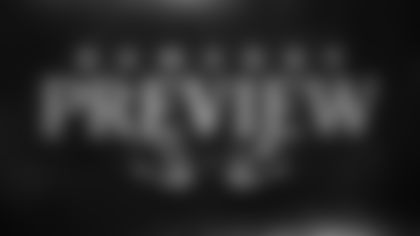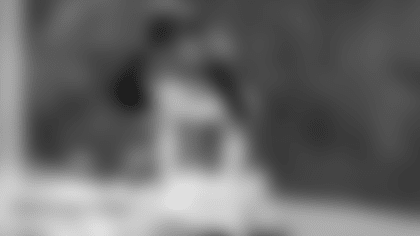Assistant Head Coach/Special Teams Coordinator Jerry Rosburg
How did Sunday in Chicago rank as far as kickers dealing with unusual weather conditions? (Luke Jones)"From my personal involvement, that was one of the most interesting ones. I've had snow games that were that windy, but I've never had a rain game that was quite that windy. And the field added to the excitement because of the footing. Honestly, I thought both sides … The specialists on both teams did a remarkable job dealing with it. I think our guys did, and I think their guys did as well."
What have you seen from Jacoby Jones as far as being close to making some big plays in the return game? (Aaron Wilson)"We're striving for that – for big plays from Jacoby – because we all know that he can be that. He's had a couple opportunities; we had one on Sunday that looked like he might get out of there and then didn't quite get there. We're going to keep working at it, and as you know that's an 11-man operation; it's not just one man making a touchdown. We've got guys that now have gained a lot of experience, and the results, I think, are coming. I'm confident that we'll be better and better as we go down the road here."
Offensive Coordinator Jim Caldwell
You're facing a tough run defense this week. How do you prepare for a tough run defense?* (Adam Vorce) "Well, it's one of the better ones in the league. They give you all kinds of problems. They have very, very good personnel up front. They're big, they're physical, and they hit and run with the best of them. Then also from a schematic standpoint, they give you a number of challenges, too, because they're very, very multiple [with personnel]. Oftentimes, you have to prepare for one or two fronts with different teams, but they give you a lot of different looks. As you know, Rex has done [that] over the years. They compound issues, they present problems for you, but their personnel presents problems for you from a schematic standpoint. We'll have to look at all those things closely and try to get in the best situation for us."* **
This is more of a philosophical question, but John [Harbaugh], in recent weeks, has talked about the CBA and the lack of practice time, that it's been tougher on pass protection across the league – not just here. From your perspective, when building offensive lines, is it something where you need a little bit of time for a group to gel just for that familiarity to happen? You see the lines that have been held together for years and years seem to be more successful.* (Matt Vensel) "I think it takes time. I think, certainly, you have to get accustomed to working next to one another where they get to the point where they've had so many repetitions together, that they can almost determine exactly what the other guy is doing before verbal communication. You find that in two different positions on the football team. I think you find that with offensive lineman, because they work in close proximity to one another, and in the secondary. Those groups of individuals, there are so many of them, in terms of the perimeter and in terms of up front. I think that's the challenge for both positions."* **
With free agency, does that make it tougher? It seems like every year there is going to be at least one or two new guys shuffled in. (Matt Vensel) "It's one of those things where, there are going to be issues like that developed in our game because of the way in which it's structured. They're not things that prohibit you. Our job is to get them in shape, get them going and get ourselves in position to win games. I think we all understand that – that's the bottom line. We have to find a way to get it done. Things of that certain nature have to be overcome. In this league, they have to be overcome quickly as well; you don't have a whole lot of time. [We've] got patience, but we don't have a whole lot of time."* *
Jim, as far as against Chicago, what was better as far as the run game? What did you see as far as improvement, aside from just the numbers? (Matt Zenitz) "Typically, when the numbers show up in the way in which they did, you did some things well. We did some things well; we didn't do everything well. We didn't do everything well; we didn't play perfectly. I think our guys did show some improvement, just in terms of our combination blocking and things of that nature. When you look at something like that, it's not just one area. It wasn't just the fact that the offensive lineman did a better job – which they did. We have tight ends that block, as well. Our backs did a nice job running the ball. Our quarterback did a great job getting us into the right plays. Our receivers did a nice job blocking on the perimeter, as well. We were able to get a few chunk plays on the line. I think as a group collectively, we played better. But, that's one game; the results still weren't what we wanted in terms of the end result. We've got a real challenge ahead of us this week, and as we talked about a little earlier, [the Jets are] maybe the finest run defense in the league."* *
Last year when you took over, this team became one of the best in the league with passing the ball deep. This year is probably not meeting your expectations. What's been the biggest difference there from last year to this year? (Jamison Hensley) "Oftentimes, you can't pinpoint exactly what it was. We've taken a few shots here and there. We just haven't been able to connect as often as we like, and that's something that we continue to work on. Obviously, we think we do have speed. [We have] a quarterback that has a strong arm with speed that can stretch the field, not only vertically but horizontally as well. We continue to work on it; we continue to try to get better. It's not quite where you want to be yet, but we continue to work on it."* *
From a red zone perspective, what do you lose when Marlon Brown is not able to play in the games? (Garrett Downing) "I'm not certain I would phrase it that way, because I do think that we have a number of guys that play down there pretty well. Marlon [Brown] gives you a big target and he has his strengths, but I think some of the other guys are fairly quick and can find seams. We'd get down there three times and we score touchdowns twice. We'd like to be 100 percent in that area; we don't care how we get it in. Whether we run it in or throw it in, we just want to score. We have to be able to spread it out and use all of our weapons, not only from a running game stand point, but we have guys that are in our scheme that can block. Guys like Ray [Rice] and [Bernard] Pierce can run the ball in. Then, we also have to be able to have guys on the flanks that can catch it and get in the end zone. We do have that, but Marlon gives you a little bit bigger target. He's one amongst a crew of guys that play very well in that area."
Jim, why hasn't the production been there in recent weeks for Jacoby Jones? What do you guys need to do to get him going? (Matt Vensel) "I think for the most part, we've been spreading the ball around quite a bit. I think there have been a lot of guys that have gotten a couple of balls here, a couple of balls there. There hasn't been anybody, other than Torrey [Smith], that's gotten a bit more than others. We've got to continue to try to use the guys that have the ability to do some things for us. We've just got to look at it. Every game is different. Some games, one guy may get a few more here or there, but typically, Joe [Flacco] throws to the open guy. He works and reads his progressions. Oftentimes, you may find a guy didn't get as many catches as he would like or we would like to get to him. That's just the nature of the coverages – the nature of the situation for which it occurred. In some situations, we call a play for a particular guy and get it to a particular guy, but coverage dictates otherwise. We have to certainly read our progressions and get it to the guy who is open."
Defensive Coordinator Dean Pees
**What kind of progression have you seen from your early-round draft picks? *(Matt Zenitz) *"I feel like they're all coming along very, very well. The more they see things, the more they understand the defense. We still have our moments, but each week it gets a little bit better, a little bit better. I'm pleased with all of our rookies. I think they've all done a good job; they've all contributed. John [Simon] hasn't played as much on defense as some of the other guys. But Arthur Brown – the more he sees it, the more he understands it. The more we rep it, the better he becomes at it. It's the same thing with Matt Elam back there. In the back end, there are a lot of things that can happen back there, and the more you see it, the more you get accustomed to it. I'm very pleased with all of our rookies."
**Is it fair to say that Matt Elam is still progressing, but that the mistakes he's made have been fewer in the past couple of weeks? *(Matt Zenitz) *"Yes, I'd say most definitely the mistakes by all of the rookies have been less and less every week. Some of the things they did early on, I think they've learned from those mistakes. Every week I think they've gotten better."
**Head coach John Harbaugh has talked about Arthur Brown's approach to the game. What have you seen from him as far as the cerebral aspect of his game? *(Garrett Downing) *"Very few guys coming out of college, I think, have any idea of what it's really like in professional football – the amount of attention to detail – because it's your job. It's your job in college, but it's different. You're on scholarship; you're not going to lose the scholarship. You're going to be there for four or five years. It's different when it's your profession. And the more they're around guys that are good examples of that, the better they become. It's not Art [Brown], it's not anybody – they just come in, 'Yeah, I'm supposed to study.' Then they find out, 'Yeah, I'm really supposed to study.' And the other thing is most of these guys at this point in time are getting ready for a bowl game or finishing up the season, and we've still got six-plus games to go. It takes some acclimation, but I think those guys have done better and better. He's gotten better and better in the classroom all the time. All of them have."
What are some of the things you do to try to encourage turnover creation, and are the guys following through on that? (Pete Gilbert) *"First of all, we haven't recovered some of the fumbles that we've caused. It's just like even on that play last week that the tight end caught the ball over 'Webby' [Lardarius Webb] and came up, and the guy really exposed the ball, and Corey [Graham] went to swipe it, and he missed it. It wasn't like he didn't make an effort to strip it. He did more than just tackle; he tried to strip it, and the guy held on to it. We've got to do a better job of … Sometimes, it's just getting to the ball – maybe it's playing zone a little bit more – whatever it might be. You've just got to create them. It's a difficult question, because there have been some years where I've been on some really outstanding defenses, and we didn't have a lot of turnovers. And then I've seen some defenses – and I don't want this to [come across] the wrong way – but the Saints a couple years ago, when they went to the Super Bowl, defensively, they weren't ranked real high but had a bunch of turnovers. So sometimes, it just is what it is. You keep trying to stress it. The best way to do it is just be physical, hit hard and run to the ball, and usually those things are going to happen. I do think we do that, but we haven't maybe created them enough. I don't really have another answer other than we keep stressing it, we keep talking about it every week, and I think our guys try to do it in practice, but we've just got to keep working at it." *
**What have you seen from Geno Smith this year? *(Matt Zenitz) *"I think like most people probably think of rookies – sometimes you're kind of hot and cold, like our rookies have probably been at some point in time. They've looked real, real good, and then they've looked real average. When you're coaching on defense, and you're coaching against anybody on offense, you're always looking at what they do best, not what they do the worst. You don't ever expect anything to be bad. You expect everything to be good. So, what we do is we look at all the plays that he's made because those are the ones we have to defend. You can't ever count on a guy to fumble the ball. You can't ever count on a guy throwing you an interception. All the things that he's done well are the things that we look at and try to stress to our defense."
What does Geno Smith do well? (Matt Zenitz) *"First of all, he's run the ball. If you watched the New Orleans game, he made a key touchdown down in the red area on a zone-read play, and he's also made some really good throws. He's taken some hits and stuff, which are not always his fault, and sometimes maybe it is. He's thrown the ball well at times, and there have been some times when he's run the ball well. And they run the ball, period, well with [No.] 33 [Chris Ivory] and [No.] 29 [Bilal Powell]. Those guys are really, really good running backs." *
**Red zone defense seems to be a point of pride with you guys. Why do you think you've been able to defend so well in the red zone this year? *(Matt Vensel) *"There are a couple of things. I think there is a feeling of confidence, like there is on anything. I think that's the way it is on third down, too. Teams that are usually good on third down are very confident on third down. They just seem to kind of maybe notch it up a little bit more. We do some things down there that I think are unique that other teams don't do that I think our guys handle pretty well. And we've been doing them now for a couple years. When I came here, we installed a coverage that I think our guys play very well. [We] didn't play it well the first year we were here, but we play it well now because I think they feel comfortable with it. And the other thing is, in certain ways, it's easier to defend down there [because] you've got less field to defend."
**Does that allow you to take more calculated risks down there – the fact that you can't get beat over the top? *(Matt Vensel) *"It just depends. So much of it is based on what the other team does – what their best plays are, what their formations are, what their personnel is. There is just so much that goes into it than just that. There are times to take risks, and there are times where we have played not very high risk, played coverage and played well. I think the key thing is don't do anything all the time. Don't do the same thing all the time."
**What are the challenges of defending a guy like Geno Smith? *(Adam Vorce) *"He's a good athlete. It's not so much Geno Smith; it's the offense. It doesn't really matter who is running it back there. I think sometimes too much is put on … There are certain guys like [Peyton] Manning and certain guys like that – really even Manning – you're still defending the system, not necessarily the man. You've got to defend what they do best scheme-wise, because even if Geno is not in there, and it's [Matt] Simms or [David] Garrard or whoever it might be, it's going to be the system that [offensive coordinator Marty] Mornhinweg puts out there, and that's what you've got to defend. It's not so much about Geno; it's about the Jets' offense."
**In the last year and a half, a lot of people have talked about the read-option. Is the Wildcat still a viable threat, because the Jets are one of the few teams that still use it with Josh Cribbs? *(Matt Vensel) *"I think it's like anything. I think with the Wildcat, which started [and] opened up on me in Miami when I was with New England … I have the dubious honor of seeing the first one. *(laughter) *I think the shock has worn off finally. It's like anything else. The Wildcat isn't dead – it's just the zone-read is kind of like the Wildcat. So, the more you see all that stuff, the more you defend it, the more it's not a surprise. The first time we saw that thing up in New England, it was a surprise. And the next time we played them three weeks later, we beat them pretty good. It's like anything else. The more you see it, the more defenses have an opportunity to see all that kind of offense, the better you can scheme for it. When it's a shock … The other thing about the zone-read, though – you can defend it, [but] it also depends on the guy running the trigger, because I ran that in college, and Josh Cribbs was my quarterback. And I told him, 'Don't read anything. That guy cannot tackle you; just pull it.' The better the athlete is as a quarterback … You can run the zone-read with Peyton Manning, [but] I don't think it's going to look like a zone-read with Geno Smith. So, it isn't so much the zone-read, it's a lot of times the guy who is running it."

















